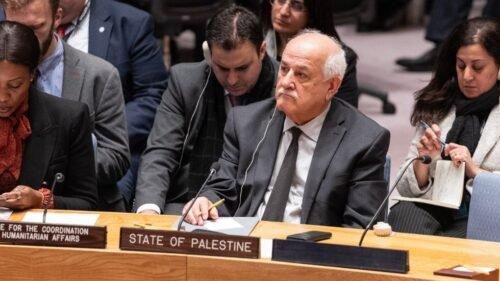The recognition of Palestinian statehood by the UK, France, Australia, Canada, Belgium and Portugal has been seen by some as a watershed, and by others as empty symbolism. But does it really matter?
The answer is: Yes, it does. It matters not only for Palestine and Israel, but also in the broader context of global geopolitics. In terms of the Israeli-Palestinian conflict in particular, there is undeniable momentum gathering. For those holdouts standing behind the US, the pressure is building.
However, like all aspects of the Israeli-Palestinian conflict, this is not a sudden change. It is a conflict with deep roots, characterized by evolution rather than revolution. Back in the late 1980s, Russia and China recognized a Palestinian state as part of collective Communist support for the Palestinian Liberation Organization (PLO).
Fast forward to 2014, when Sweden became the first Western European state to recognize Palestine, to little effect. Ten years later, in the wake of the current manifestation of the conflict in Gaza, four more European countries — Spain, Norway, Ireland and Slovenia — followed suit.
If one now looks at the UN General Assembly, non-recognition of Palestine is a lonely position. With the move by the UK and France, the US becomes the only permanent member of the Security Council not to recognize Palestine. Among the G20 (an international forum comprising 19 countries and two regional bodies that seeks to find solutions to global economic and financial issues), it is only joined now by Germany, Italy, Japan and South Korea.
Israel is losing the argument
Actions speak louder than words. The movement of states to a position of recognition of the Palestinian state is evidence that Israel and the US are losing the global argument regarding the Israeli-Palestinian conflict.
That doesn’t mean anything drastic will occur on the ground. Israel has overwhelming military superiority in the field and the backing of the world’s leading superpower. That makes it secure in pursuing whatever course it chooses for the time being.
However, the drip-drip of loss of Western backing for the US position on the conflict is telling. Many observers have lamented that the current move by the UK and France is too little too late. Certainly, these nations’ governments probably feel that their hands are being forced by events on the ground and the resulting public opinion.
It is also telling that three of the major states that remain holdouts — Germany, Italy and Japan — were defeated in the Second World War. Why bring up old history, you might ask? Because old history has everything to do with the Israeli-Palestinian conflict, and the unqualified support for Israel that these states offer is deeply entwined with their wartime histories.
Nothing will change
Despite the pendulum swinging against the US position on the Israeli-Palestinian conflict, little evidence of that swing will be apparent in events in the conflict in the Middle East. This is because the US position is perhaps as entrenched as it has ever been, and seems unlikely to alter with the current administration.
It is also because, despite this significant gesture and the ensuing diplomatic ramifications, neither the UK, nor France, nor any of the other nations that have recognized the Palestinian state wishes to actively escalate the conflict. This is not state activism within the Israeli-Palestinian conflict, but rather state management of an acute public relations situation.
No Western nation has any plans to seriously strain ties with the Trump administration in Washington. A hallmark of bilateral relations in the new era has been a desire to work with, and at times placate, the US government. No Western government will allow the Israeli-Palestinian conflict to derail such efforts.
However, the very fact that the domino recognitions are occurring at all points to a wider change in the geopolitical landscape. What they do represent is a further fragmentation of global alliances and traditional stances. In the new era of transactional foreign policy, led by the major powers of the US, China and Russia, we are seeing states branch out and take up positions on specific issues tailored to their own particular, sometimes domestic, needs.
For the likes of the UK, France, Australia and Canada, the recognition of Palestinian statehood must be viewed not only as a response to the Israeli-Palestinian conflict, but also as a response to the US administration of President Donald Trump.
The governments of these nations, which have all, in their different ways, found avenues to working with the Trump administration in pragmatic ways, are sending a proxy message to their domestic and international constituencies through this action. They can embed this decision within a narrative around international law and human rights.
In doing so, they can establish a marker for certain principles they wish to be associated with, despite their need to employ considerable realpolitik in dealing with the new realities of great power politics. This is liable to be an issue-based alliance of circumstance, rather than any lasting move towards a new center of gravity.
Do not expect the likes of the UK and France to be moving decisively out of lockstep with the US more broadly. After all, on the very eve of the UK’s recognition of Palestine, its Prime Minister and Royal Family were playing host to President Trump’s second state visit, in lavish style.
Like many moments in the long history of the Israeli-Palestinian conflict, this is a decisive and significant moment, yet it is also one that will not fundamentally alter the course of a conflict that continues to evolve according to its own merciless dynamics.
[Kaitlyn Diana edited this piece.]
The views expressed in this article are the author’s own and do not necessarily reflect Fair Observer’s editorial policy.
Support Fair Observer
We rely on your support for our independence, diversity and quality.
For more than 10 years, Fair Observer has been free, fair and independent. No billionaire owns us, no advertisers control us. We are a reader-supported nonprofit. Unlike many other publications, we keep our content free for readers regardless of where they live or whether they can afford to pay. We have no paywalls and no ads.
In the post-truth era of fake news, echo chambers and filter bubbles, we publish a plurality of perspectives from around the world. Anyone can publish with us, but everyone goes through a rigorous editorial process. So, you get fact-checked, well-reasoned content instead of noise.
We publish 3,000+ voices from 90+ countries. We also conduct education and training programs
on subjects ranging from digital media and journalism to writing and critical thinking. This
doesn’t come cheap. Servers, editors, trainers and web developers cost
money.
Please consider supporting us on a regular basis as a recurring donor or a
sustaining member.
Will you support FO’s journalism?
We rely on your support for our independence, diversity and quality.








Comment